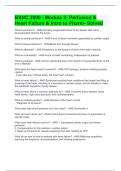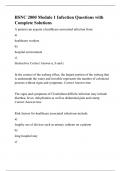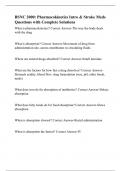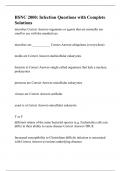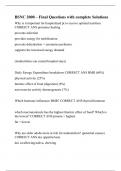Bsnc 2000 - Study guides, Class notes & Summaries
Looking for the best study guides, study notes and summaries about Bsnc 2000? On this page you'll find 62 study documents about Bsnc 2000.
Page 4 out of 62 results
Sort by
BSNC 2000 - Module 3: Perfusion & Heart Failure & Intro to Pharm- Solved
BSNC 2000 Module 1 Infection Questions with Complete Solutions
BSNC 2000: Pharmacokinetics Intro & Stroke Meds Questions with Complete Solutions
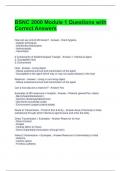
-
BSNC 2000 Module 1 Questions with Correct Answers
- Exam (elaborations) • 7 pages • 2024
- Available in package deal
-
- $13.99
- + learn more
BSNC 2000 Module 1 Questions with Correct Answers How can we control MO levels? - Answer-- Hand hygiene - Aseptic techniques - Disinfection/Sterilization - Antimicrobials - Vaccination 3 Components of Epidemiological Triangle - Answer-1. Infectious Agent 2. Susceptible Host 3. Environment Host - Answer-- Living object - Allows sustained survival and transmission of the agent - Susceptible to the agent which may or may not cause disease in the host Reservoir - Answer-- Living or...
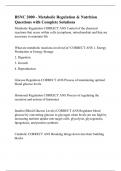
-
BSNC 2000 - Metabolic Regulation & Nutrition Questions with Complete Solutions
- Exam (elaborations) • 23 pages • 2024
-
- $13.99
- + learn more
Metabolic Regulation CORRECT ANS Control of the chemical reactions that occur within cells (cytoplasm, mitochondria) and that are necessary to maintain life What are metabolic reactions involved in? CORRECT ANS 1. Energy Production or Energy Storage 2. Digestion 3. Growth 4. Reproduction Glucose Regulation CORRECT ANS Process of maintaining optimal blood glucose levels Hormonal Regulation CORRECT ANS Process of regulating the secretion and actions of hormones Insulin (Blood Glucos...
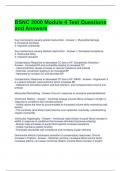
-
BSNC 2000 Module 4 Test Questions and Answers
- Exam (elaborations) • 7 pages • 2024
- Available in package deal
-
- $12.49
- + learn more
BSNC 2000 Module 4 Test Questions and Answers Key mechanisms causing systolic dysfunction - Answer-1. Myocardial damage 2. Excessive workload 3. Impaired contractility Key mechanisms causing diastolic dysfunction - Answer-1. Decreased compliance 2. Obstructed filling 3. Impaired relaxation Compensatory Response to decreased CO due to HF: Sympathetic Activation - Answer-- Increased HR and contractility leading to increased CO - Vasoconstriction causes increase in vascular resistance a...
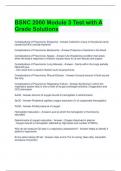
-
BSNC 2000 Module 3 Test with A Grade Solutions
- Exam (elaborations) • 7 pages • 2024
- Available in package deal
-
- $11.99
- + learn more
BSNC 2000 Module 3 Test with A Grade Solutions Complications of Pneumonia: Empyema - Answer-Collection of pus in the pleural cavity caused by MOs (usually bacteria) Complications of Pneumonia: Bacteremia - Answer-Presence of bacteria in the blood Complications of Pneumonia: Sepsis - Answer-Life-threatening condition that arises when the body's response to infection causes injury to its own tissues and organs Complications of Pneumonia: Lung Abscess - Answer-- Cavity within the lungs...
BSNC 2000: Infection Questions with Complete Solutions
BSNC 2000 – Final Questions with complete Solutions
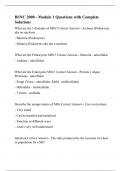
-
BSNC 2000 - Module 1 Questions with Complete Solutions
- Exam (elaborations) • 14 pages • 2024
-
- $14.49
- + learn more
What are the 3 domains of MOs? Correct Answer-- Archaea (Prokaryote aka no nucleus) - Bacteria (Prokaryote) - Eukarya (Eukaryote aka has a nucleus) What are the Prokaryotic MOs? Correct Answer-- Bacteria - unicellular - Archaea - unicellular What are the Eukaryotic MOs? Correct Answer-- Protists ( Algae; Protozoa) - unicellular - Fungi (Yeast - unicellular; Mold - multicellular) - Helminths - multicellular - Viruses - acellular Describe the unique nature of MOs Correct Answer-- Li...

That summary you just bought made someone very happy. Also get paid weekly? Sell your study resources on Stuvia! Discover all about earning on Stuvia

